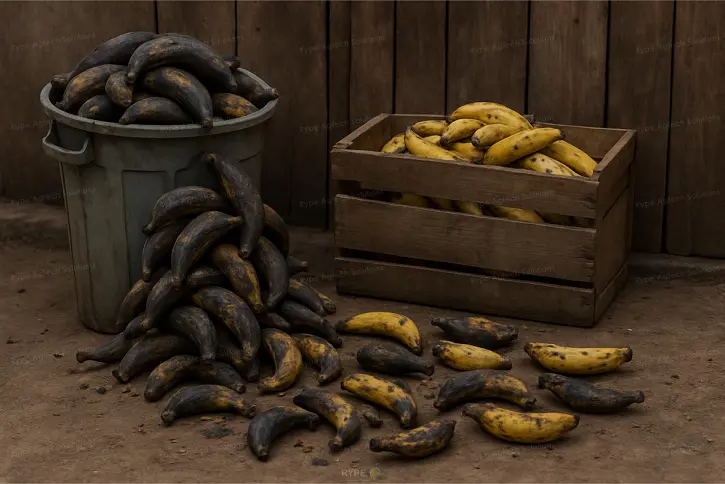Beyond the Harvest: Fixing Nigeria’s Food Economy Leak

Nigeria's fertile lands produce abundant plantains and bananas, essential to its culture and economy. However, post-harvest losses represent a significant issue, with 30-40% of production often wasted. For every ten bunches harvested, three or four may never reach the market or spoil before consumption. This loss impacts farmers' revenue and the nation's food supply. The main challenges contributing to this waste are poor handling, inadequate storage, and inefficient logistics. The journey of a plantain or banana from farm to table is challenging, starting with poor handling at harvest. Traditional methods often involve dropping bunches onto hard ground, causing bruises that lead to decay. During transportation, fruits are piled high in open trucks without proper cushioning or ventilation, leading to further damage on bumpy roads. Sorting and packing can also inflict harm, accelerating ripening and spoilage before they reach consumers.
After harvesting, the challenge of inadequate storage arises. Plantains and bananas, being perishable, continue to ripen and spoil without proper temperature and humidity control. Nigeria suffers from a lack of accessible cold storage facilities, leading to much of the produce being stored in warm, humid conditions during peak seasons. This accelerates ripening, decay, and the growth of harmful fungi. Additionally, poor ventilation allows ethylene gas to build up, further hastening spoilage. The absence of proper storage also makes the fruits vulnerable to pest infestations, resulting in additional losses.
The transportation of produce from farm to market is hindered by inefficient logistics and poor road infrastructure, leading to slow and damaging transit. Extended travel times and rough conditions result in damaged or spoiled fruit. Inadequate transport vehicles, such as lacking refrigerated trucks, further exacerbate this issue. The fragmented supply chain, with multiple intermediaries, increases the risk of damage and delays. Consequently, this leads to gluts and shortages in different markets, causing waste when surplus produce cannot be sold quickly.
The consequences of these 30-40% post-harvest losses extend far beyond a few bruised fruits. For the farmers, who pour their sweat and resources into cultivation, this translates into a direct and devastating loss of income. It's a significant reduction in their potential revenue, undermining their livelihoods and discouraging future investment in a vital agricultural sector. This directly contributes to rural poverty, trapping many in a cycle of under-earning despite their hard work. For the national economy, these losses represent foregone economic activity, diminished contributions from agriculture to the Gross Domestic Product, and potentially a greater reliance on food imports to meet domestic demand. The losses in agricultural production hold significant implications for food security and nutrition. The reduction of such a considerable volume of output results in diminished food availability, particularly as the global population continues to grow. Plantains and bananas serve not merely as sources of caloric intake, but also as important providers of carbohydrates, essential vitamins such as B6 and C, and critical minerals including potassium. When these fruits spoil, their nutritional value is lost, which contributes to existing dietary inadequacies. Moreover, a decrease in supply due to these losses typically leads to increased market prices, rendering these staple foods less accessible for low-income households and further exacerbating issues of food insecurity and nutritional deficiencies across the nation. The inefficiencies associated with food waste also impose environmental costs. The land, water, labour, and energy dedicated to producing the wasted commodities represent lost resources. Additionally, as spoiled food decomposes, it generates methane, a potent greenhouse gas, thereby contributing to the overarching challenge of climate change.
Addressing this challenge requires collaboration and investment in training programs for farmers on gentle harvesting, proper de-handing, and pre-cooling techniques. Promoting the use of reusable plastic crates and developing a robust cold chain with decentralized storage facilities and refrigerated transport is essential. Implementing effective on-farm storage solutions for better ventilation and pest protection can significantly reduce losses. Local processing initiatives for plantains and bananas into products like flour or chips can also create economic opportunities. Additionally, improving logistics through investments in rural roads and establishing sorting and storage hubs will streamline the supply chain. Utilizing technology for real-time market information will aid farmers in making informed selling decisions.
We believe that after addressing these issues, Nigeria can reduce post-harvest losses, empower farmers, and enhance food security in its plantain and banana industry.
